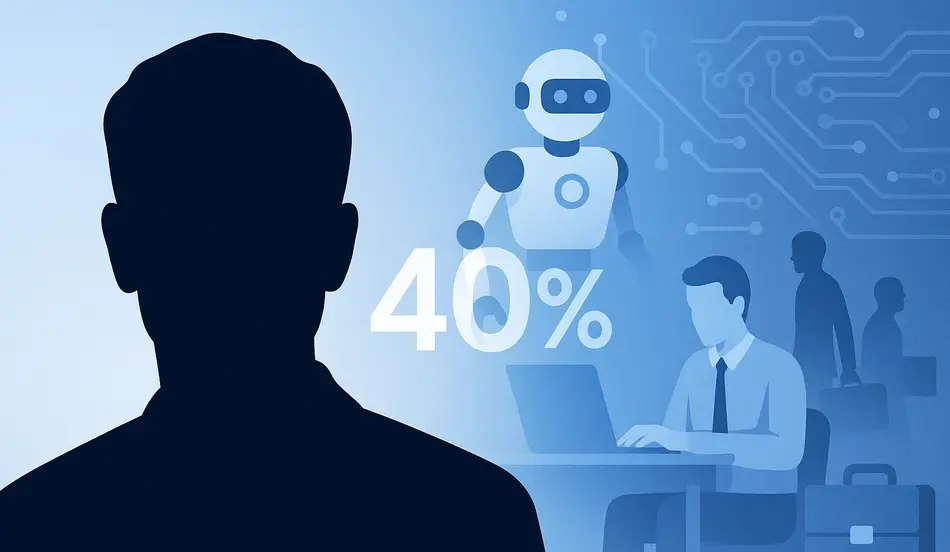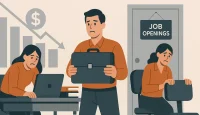Sam Altman explains why AI will replace 40% of your work in a revealing interview that provides unprecedented insight into how artificial intelligence will fundamentally transform the job market. The OpenAI CEO’s predictions about AI’s impact on employment are both optimistic and sobering, offering a roadmap for how workers can adapt to an AI-driven economy while highlighting the skills that will remain uniquely human.
Altman’s analysis goes beyond simple job replacement statistics to explore the deeper implications of AI integration in the workplace. Rather than focusing on entire job categories disappearing, he emphasizes that AI will transform the nature of work itself, with many tasks being automated while new opportunities emerge for human creativity, empathy, and problem-solving.
The OpenAI CEO’s perspective is particularly valuable because he’s at the forefront of AI development, with access to the most advanced AI systems and a deep understanding of their capabilities and limitations. His predictions about AI’s timeline and impact are based on real technological progress, not theoretical speculation.
Altman’s vision of the future workplace is one where humans and AI work together, with AI handling routine tasks while humans focus on the uniquely human skills that machines cannot replicate. This collaborative model represents a fundamental shift from the traditional view of AI as a replacement for human workers.
The 40% Task Replacement: A More Nuanced View
Altman’s prediction that AI will replace 40% of current work tasks represents a more sophisticated analysis than simple job replacement statistics. He emphasizes that the focus should be on tasks rather than entire jobs, as most jobs will be transformed rather than eliminated entirely.
This distinction is crucial for understanding how AI will impact the workforce. Rather than entire professions disappearing, most jobs will evolve to incorporate AI tools and capabilities, with humans focusing on the aspects of their work that require uniquely human skills.
The 40% figure reflects Altman’s assessment of how much of current economic activity can be automated using existing and near-term AI capabilities. This includes routine tasks, data processing, analysis, and many forms of content creation that currently consume significant human time and effort.
The remaining 60% of work will require human skills that AI cannot replicate, including emotional intelligence, creativity, strategic thinking, and the ability to understand and respond to human needs and desires.
The Timeline: Superintelligence by 2030
Altman’s timeline for AI development is both ambitious and specific. He predicts that by 2030, AI systems will be “extraordinarily capable” and able to do things that humans cannot do on their own, including making scientific discoveries that would be impossible for humans to achieve independently.
This timeline is based on the rapid progress OpenAI has observed in AI capabilities over the past few years. Since ChatGPT’s launch, AI models have become significantly more capable, and Altman sees no signs of this progress slowing down.
The prediction includes specific milestones: by 2026, Altman expects AI models to be capable of tasks that would currently be considered impossible, with continued rapid progress through the end of the decade.
This timeline has significant implications for workforce planning and education, as workers have a limited window to develop the skills that will remain valuable in an AI-driven economy.
The Skills That Will Remain Human
Altman identifies several key skills that will remain uniquely human and become increasingly valuable in an AI-driven world. These skills center around human interaction, empathy, and the ability to understand and respond to human needs.
The most important human skill, according to Altman, is “how much people care about other people” and the ability to understand what other people want and need. This emotional intelligence and social awareness cannot be replicated by AI systems.
Other critical human skills include creativity, adaptability, and the ability to learn and grow in response to changing circumstances. These skills will become more valuable as AI handles routine tasks, freeing humans to focus on complex problem-solving and innovation.
The ability to build relationships, understand context, and make nuanced decisions based on incomplete information will also remain uniquely human capabilities that AI cannot replicate.
The Transformation of Existing Jobs
Altman’s vision of job transformation is more optimistic than simple replacement scenarios. He believes that AI will enhance human capabilities rather than simply replace human workers, allowing people to do their jobs more effectively and focus on higher-value activities.
Many existing jobs will evolve to incorporate AI tools and capabilities, with humans using AI to handle routine tasks while focusing on the aspects of their work that require human judgment and creativity.
This transformation will require workers to develop new skills and adapt to new ways of working, but it will also create opportunities for more fulfilling and creative work.
The key is for workers to embrace AI as a tool that enhances their capabilities rather than viewing it as a threat to their job security.
The Transformation of Work
AI isn’t replacing people — it’s reshaping jobs, enhancing human potential, and creating space for more fulfilling work. Employers can lead this transformation by hiring adaptable talent eager to combine creativity with cutting-edge tools. Post your job on WhatJobs today and connect with professionals ready to thrive in the AI-powered workplace.
Post a Job Free for 30 Days →The Creation of New Jobs
Altman is optimistic about the creation of new jobs that will emerge as a result of AI development. He points to historical precedent, noting that every 75 years, about half of all jobs in society change, even without AI.
The AI revolution will likely accelerate this process, creating entirely new categories of jobs that are difficult to imagine today, just as many current jobs would have been unimaginable 30 years ago.
These new jobs will likely focus on human-AI collaboration, AI oversight and management, and the development of new products and services that leverage AI capabilities.
The challenge will be ensuring that workers have the skills and training needed to transition into these new roles.
The Education Imperative
Altman’s advice for his own son reflects his broader recommendations for education in an AI-driven world. He emphasizes the importance of developing skills that will remain uniquely human, particularly the ability to learn, adapt, and understand human needs.
The key skills for the future include learning how to learn, developing resilience to change, and understanding how to create value for other people through products and services.
Traditional education models may need to be updated to focus more on these human skills rather than memorization and routine task performance.
The ability to work effectively with AI tools and understand their capabilities and limitations will also be crucial for future success.
Frequently Asked Questions
Sam Altman explains why AI will replace 40% of your work – what does this mean?
Sam Altman explains why AI will replace 40% of your work by focusing on task automation rather than job elimination, with AI handling routine tasks while humans focus on uniquely human skills like empathy and creativity.
What is Altman’s timeline for AI development?
Altman predicts superintelligence by 2030, with AI systems capable of scientific discoveries humans cannot make, and expects continued rapid progress through 2026 with models performing tasks currently considered impossible.
What skills will remain uniquely human?
Skills that will remain human include emotional intelligence, creativity, adaptability, the ability to understand human needs, build relationships, and make nuanced decisions based on incomplete information.
How will existing jobs be transformed?
Existing jobs will evolve to incorporate AI tools, with humans using AI for routine tasks while focusing on higher-value activities requiring human judgment, creativity, and interpersonal skills.
What new jobs will AI create?
AI will create new jobs focused on human-AI collaboration, AI oversight and management, and developing new products and services that leverage AI capabilities, though many are difficult to predict today.
How should workers prepare for AI transformation?
Workers should develop learning skills, adaptability, resilience to change, and the ability to understand and create value for other people, while learning to work effectively with AI tools.
A Real-World Example: The Marketing Professional’s Adaptation
Sarah Chen, a marketing manager at a mid-sized tech company, exemplifies how workers are adapting to Altman’s vision of AI-transformed work. “When I first heard about AI replacing jobs, I was terrified,” she explains. “But after using AI tools for about a year, I’ve realized it’s actually making me better at my job.”
Sarah’s experience reflects Altman’s prediction about task transformation rather than job elimination. “I used to spend hours analyzing data and writing reports,” she says. “Now AI handles the data analysis, and I can focus on understanding what our customers really want and developing creative campaigns that resonate with them.”
The shift has required Sarah to develop new skills. “I’ve had to learn how to work effectively with AI tools, but more importantly, I’ve focused on developing my emotional intelligence and ability to understand human behavior,” she explains. “These are the skills that make me valuable now.”
Sarah’s role has evolved significantly. “I’m no longer just a data analyst or content creator,” she says. “I’m a strategist who uses AI to understand market trends and customer needs, then develops creative solutions that AI couldn’t come up with on its own.”
The transformation hasn’t been without challenges. “I had to completely rethink how I approach my work,” Sarah explains. “But the result is that I’m doing more creative, strategic work that I find much more fulfilling.”
Sarah’s experience illustrates Altman’s vision of human-AI collaboration. “AI handles the routine tasks that used to consume my time, freeing me to focus on the human aspects of marketing that require creativity, empathy, and strategic thinking,” she says.
Her advice to other workers reflects Altman’s recommendations. “Don’t see AI as a threat,” she says. “See it as a tool that can enhance your capabilities. Focus on developing the human skills that AI can’t replicate, and learn to work effectively with AI tools.”
Sarah’s story demonstrates how workers can successfully adapt to an AI-driven economy by embracing change, developing new skills, and focusing on the uniquely human aspects of their work.
Embrace the AI Transformation
Sam Altman’s explanation of why AI will replace 40% of work provides a roadmap for navigating the AI revolution. Rather than fearing job displacement, workers should focus on developing the human skills that will remain valuable in an AI-driven economy.
The key is to embrace AI as a tool that enhances human capabilities rather than viewing it as a threat to job security. By focusing on skills like emotional intelligence, creativity, and the ability to understand human needs, workers can position themselves for success in the AI era.
The transformation will require adaptability and a willingness to learn new skills, but it also offers opportunities for more fulfilling and creative work. The future belongs to those who can effectively collaborate with AI while maintaining their uniquely human capabilities.
The time to prepare for this transformation is now, as the AI revolution is already underway and accelerating rapidly. Workers who embrace change and develop the right skills will thrive in the AI-driven economy of the future.




